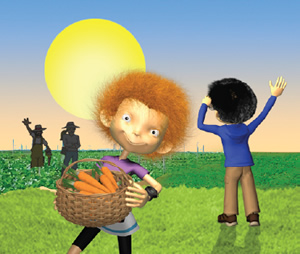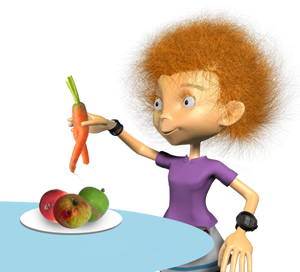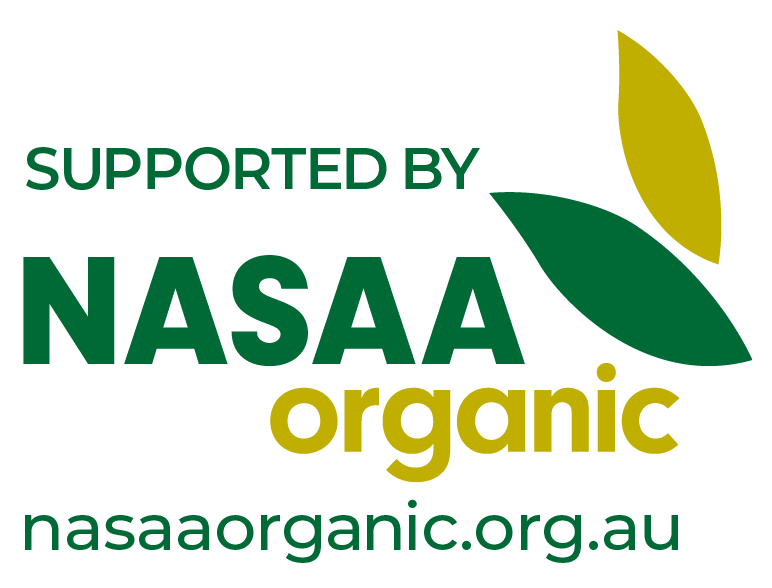Organic farming is a method of growing crops and raising livestock that involves much more than deciding not to use synthetic pesticides, fertilisers, genetically modified organisms (GMO), antibiotics and growth hormones.
The main goal of organic production is to have farms and producers that use methods that are sustainable and harmonious with the environment. Organic farmers use the natural ecosystems for their farming practices.
- Early farming to modern farming
- What is wrong with using synthetic chemicals?
- What is organic farming?
- Healthy soil
- Animal welfare
- Are Organic, Free-range and Grass-fed all the same thing?
- Becoming ‘Certified Organic’
- More about the Australian Organics industry
- Did you also know…
A printable PDF of the information on this page is available in the right-hand column.
Early farming to modern farming

Early farming would have been classified as organic because farmers did not use synthetic chemical fertilisers, pesticides and modern farming innovations such as genetic modification (GM). Most of these farms were small and run by small family groups, and only provided food to people in the nearby villages and towns. Many of these farms grew lots of different crops, but only small amounts of each.
As populations grew, and people moved into cities, farmers were encouraged to find ways to produce more food on the same land, or increase the amount of land they were farming. Farmers also started to specialise in growing particular crops.
Over time, scientists and engineers developed new technology to help farmers. New machinery (such as tractors, cultivators and planters) has been manufactured.
There have also been many new scientific developments, which aimed to kill insects and pests that damage crops, so that crops produced a greater yield. As new issues arose for farmers, scientists would find a solution for that problem.
Farmers began spraying pesticides, insecticides and fertilisers on produce and feeding or injecting growth hormones and antibiotics to animals to make them grow more quickly.
Sometimes the solution for one problem created an opportunity for a new pest, and so another chemical would then be produced to fix that new problem!
The use of all these ‘solutions’ are now showing to have an effect on the whole ecosystem, and sometimes the ‘residues’ from the sprays can still be on crops when they arrive at the market.
What is wrong with using synthetic chemicals?
Research shows that pesticides used on crops and pastures can seep into the soil, destroy native plants and even flow into our creeks and rivers and travel all the way out to sea.
People are becoming more and more aware of the types and quantities of chemicals that are used in farming fresh produce, meat and processed foods. Many consumers are looking for healthier, environmentally friendly and chemical-free produce and product alternatives, which leads them to organic food and products.
What is organic farming?

Instead of using synthetic chemicals, fertilisers, growth hormones, drugs, antibiotics and genetic modification, organic farmers use techniques that work with nature. These include using natural fertilisers, mowing and controlled grazing for weed control and rotating crops to keep the soil healthy and reduce the types of pests and diseases that occur on particular crops.
Animal welfare is very important for organic farmers, and they work hard to ensure the animals have good housing and are able to behave as ‘naturally’ as possible.
Organic farming presents many challenges. Some crops are more challenging than others to grow organically. However, nearly every commodity can now be produced organically. This includes fruit, vegetables, eggs, honey, dairy, wheat, rice, wool, beef, herbs and much more. Today, you can even buy organic processed food, organic make-up and organic cleaning products.
Healthy soil
Planting seeds and seedlings in healthy soil is one of the most important aspects of organic farming. Organic farmers often say they grow healthy soils which then allows them to produce crops and animals that are healthy. Without nutrient-rich soil, healthy plants and land for animals to graze would not be sustainable.
Successful organic farmers are observant and work hard to understand the biology of the ecosystem on their farm. From what is under the ground, to how water flows over their farm, and the unique needs of all the critters and plants that grow on their properties.
Animal welfare

Animal welfare is a high priority for organic farmers. To be classified as ‘certified organic’, animals must be able to move around freely and have access to organic pasture or feed for their entire lives. To give them a well-rounded diet, and to ensure that they receive all the nutrients they need to have a healthy life, organic animals are sometimes also fed seaweed, minerals, and natural vitamins.
Like humans, even the healthiest of animals can sometimes get sick. Organic farmers try to avoid this, but if necessary, they will ensure their animals get the treatment they need. If this means they MUST have medicines, then the animals are taken out of the production system either for a period of time, or permanently (depending upon what they are used for).
Are Organic, Free-range and Grass-fed all the same thing?
These days, on animal products (such as meat, dairy, eggs and fibres such as wool), there are many labels letting you know how the animals have been treated in the production of that product.
Some labelling on products may refer to just one part of the animal’s living and care conditions, such as the amount of space animals are given to live (e.g. 10,000 hens per hectare for eggs), or where they live (barn laid or free-range), or how they are fed (pastured eggs, or grass fed beef).
A ‘certified organic’ label lets customers know that every part of an animals’ care and management have been considered, including: breeding, feeding, social behaviour and the management of the land for pasture, to ensure the animal has the best life possible.
One of the most debated products is free-range eggs. Free-range eggs have become a popular alternative to cage eggs.
It is important to know what free-range actually means. The Australian Government1 currently states that to be free-range, an egg must be laid by a hen that has meaningful and regular access to an outdoor area during daylight hours, is able to roam and forage outside and lives on a farm that has no more than 10,000 hens per hectare.
This is just the minimum standard. Many farmers follow stricter standards than this and egg producers now label their packaging stating how many hens per hectare they farm, so that consumers are better informed.
Free-range does not mean organic. Generally, organic products are always free-range but free-range products are not always organic.
Becoming ‘Certified Organic’

To be able to use a ‘certified organic’ label, farmers must go through inspections from an organisation that can verify their farming methods. This means that they must follow some very strict rules and regulations to ensure that their products and their growing and processing practices really are organic.
Farms are inspected, the produce sampled, and records checked to ensure that certification standards have been followed exactly. The rules must be strict so that customers (you) can be sure that the end product you are buying has not been contaminated or come into contact with any prohibited chemicals from the farming system, even accidentally (e.g. pesticides could drift over from a neighbour’s farm, or be in the water used on plants).
The food fed to farm animals must also be grown organically.
Once a farm is certified organic, its produce can be labelled as ‘certified organic’. Certified organic farms are visited by an auditor once a year who checks to make sure the farmers are still adhering to organic standards.
If a conventional farmer who uses pesticides and genetic modification wants to become a certified organic farmer, it takes about three years to convert their farm to certified organic status.
More about the Australian Organics industry

Organic farming in Australia is all about quality, self-sufficiency, increased biodiversity, animal welfare, recycling and regeneration. In Australia, we know all too well what a precious resource water is, so being water efficient is an essential part of organic farming. Ensuring that the soil is healthy and full of organic matter allows it to retain more of the moisture essential for crops to survive droughts.
Australian organic products have a great reputation for being of the highest quality. According to the Australian Organic Market Report 20192, five of the top ten reasons that people in Australia buy organic products are related to the ‘free from’ aspects. This includes ‘chemical free, ‘additive free’, ‘hormone and antibiotic-free meat’, ‘non-GMO’ and ‘cruelty free’.
It also noted the top 3 motivations of shoppers to buy organic, which are:
- Awareness of the impact that food, fibre or cosmetics had on personal health.
- Awareness of the impact that food, fibre or cosmetics had on the environment.
- Animal welfare.
Organic production is increasing in Australia. The total value of the organic market in Australia for Australian produced goods is conservatively estimated to be $2.6 billion and has been growing, on average about 13% per year since 20122.
The most commonly purchased organic products in Australia are fruit and vegetables, home-cooking ingredients, dairy products, red meat, non-alcoholic beverages and canned goods2. Other organic products that you might not have thought of, such as essential oils are in organic make-up and cosmetics, and becoming very popular.
Did you also know…

- Organic fruits and vegetables can sometimes look a bit strange or imperfect. This is the way fruits and vegetables grow naturally. Not every apple is the same, perfectly round and shiny, but it is still juicy and scrumptious.
- There were 71.8 million hectares of organic farmland around the world in 20183.
- Australia has 51% of the world’s organic farmland with at least 35.7 million hectares3.
- The total value of Australian organic retail sales was 1.9 billion (AUD) in 20183.
- Organic farming has been recognised to become the largest growth industry in Australia over the next 5 years (2020-2025)4.
- The Organic farming industry is forecast to become a $3.7 billion industry by 2024-20254. Organic products grown and manufactured in Australia are exported to 61 countries, with new markets opening up in South America, Oceania, Africa, the Middle East and Europe2.
- Did you know that you can grow organic produce at home or even at school? Ask your parents or teacher if you can start your own organic garden.
1 Australian Government, Consumer Law (Free Range Egg Labelling) Information Standard 2017, viewed 20 June 2017: www.legislation.gov.au/Details/F2017L00474
2 Australian Organic Ltd, Australian Organic Market Report 2019, Australian Organic Ltd, Nundah, Qld
3 FiBL & IFOAM – ORGANICS INTERNATIONAL. The World of Organic Agriculture Statistics & Emerging Trends 2020.
4 IBIS World – 06 February 2020.





